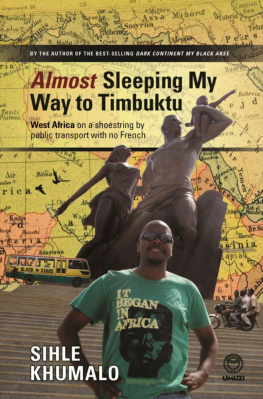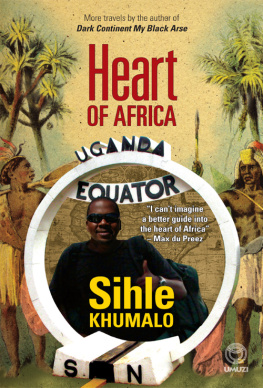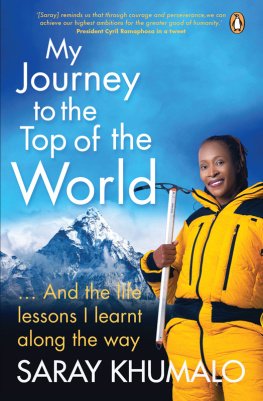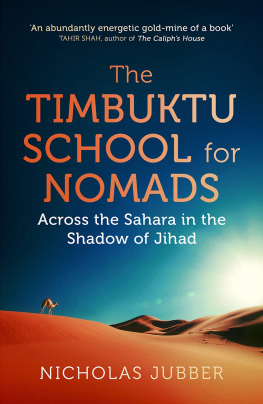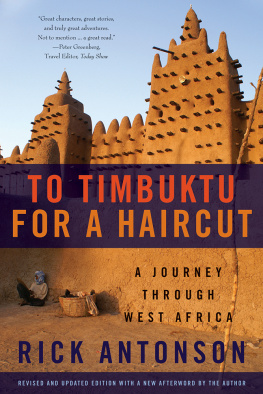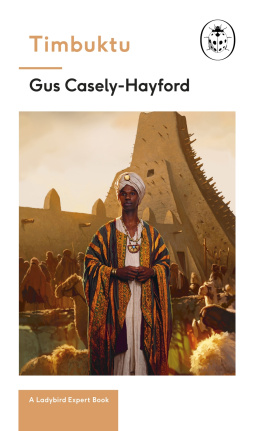ALMOST
SLEEPING MY WAY
TO TIMBUKTU
BY THE SAME AUTHOR:
Dark Continent My Black Arse
Heart of Africa
ALMOST
SLEEPING MY WAY TO TIMBUKTU
West Africa on a shoestring by public transport with no French
Sihle Khumalo
Published in 2013 by Umuzi
an imprint of Random House Struik (Pty) Ltd
Company Reg No 1966/003153/07
First Floor, Wembley Square, Solan Road, Cape Town, 8001, South Africa
PO Box 1144, Cape Town, 8000, South Africa
www.randomstruik.co.za
2013 Sihle Khumalo
All rights reserved.
No part of this book may be reproduced or transmitted in any form or by any means, mechanical or electronic, including photocopying and recording, or be stored in any information storage or retrieval system, without written permission from the publisher.
First edition, first printing 2013
1 3 5 7 9 8 6 4 2
ISBN 978-1-4152-0398-9 (Print)
ISBN 978-1-4152-0566-2 (ePub)
ISBN 978-1-4152-0567-9 (PDF)
Cover design by Marius Roux
Text design by Chrie Collins
Set in 11 op 15 pt Sabon Std
To our two precious angels,
Nala and Zawaadi
The darkest thing about Africa has always
been our ignorance of it.
GEORGE KIMBLE
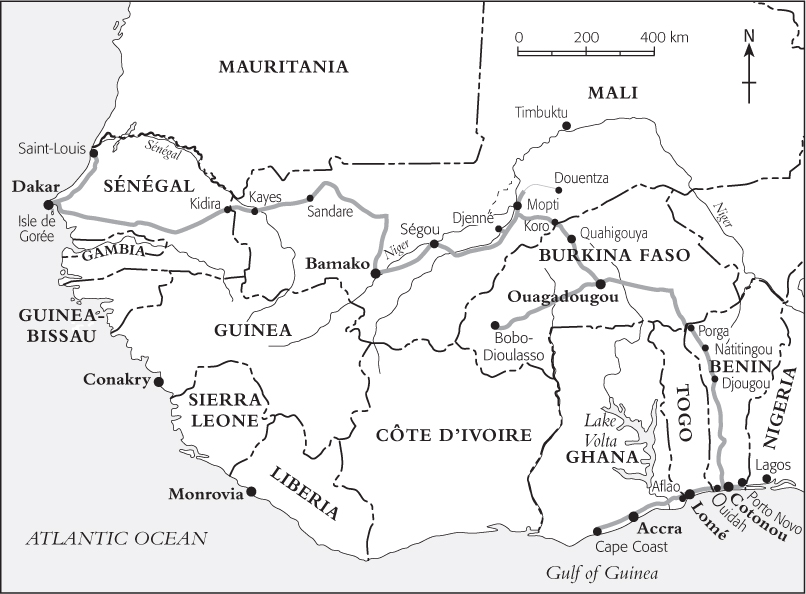
My Route through West Africa
LOOKING FORWARD
T HE SPOT WHERE EVERYTHING WAS GOING to start was now only a thousand or so metres below me. The aeroplane was about to touch down gently; the moment beckoned when the road trip, the real deal, would start at the end of the runway. The Airbus 330-200, Emirates flight EK797, was gliding over the Atlantic Ocean on its final approach to Lopold Sdar Senghor International Airport just north of Dakar. There was no turning back. I had reached my point of no return. After all, I had flown here with a one-way ticket and was about to embark on my West African adventure and explore Francophone Africa unchartered territory for most English-speaking Africans by public transport.
I was hoping to finish in the land of the Igbo, Yoruba and Hausa four weeks later, in a country named after Africas third longest river, the Niger, laying claim to being the most populous country on the Continent. Yes, I was hoping to finish in the Federal Republic of Nigeria, in Lagos, more specifically, the countrys economic capital and, after Cairo, the second most populous city in Africa.
En route through Mali, Burkina Faso, Ghana, Togo and Benin, I planned to visit five World Heritage Sites listed by unesco for their historical and cultural significance, generally inform myself about a part of the world I would be visiting for the first time, and hopefully have some fun along the way.
But besides running away from my wife, which is what every married man must do now and then to ensure that his marriage will last, I was doing this trip, like my two earlier African adventures, to calibrate my life. In life we more often than not get bogged down by day-to-day issues and the race to prosperity and success, a race with no finishing line. And in the rush to get there we become bitter about how much we do not have. Only trips like these, I find, put things into proper perspective and show you what is of ultimate importance in life. They separate the needs from the wants. If you can survive for a whole month with only the clothes in your backpack, you realise with how much unnecessary stuff you have cluttered your life.
Even though I was on an exploration trip, and as much as I wanted to discover a few more of Africas treasures, I had over time come to understand that travelling alone by public transport through other African countries is less about discovering things out there than about discovering things about yourself. Like what makes the real you tick.
Quite by coincidence, earlier on my ten-hour flight from Dubai I had spotted an article by Wael Al Sayegh in the inflight magazine, Open Skies, which encapsulated my belief about travelling, in particular travelling the way I do:
WHEN WE TRAVEL, WE ARE REUNITED WITH our adventurous selves. With destination set and path determined, our senses are heightened, our souls tuned to the frequency of the expanding universe. We are aligned with its flow, its energy, its force. We feel at home Adventure is a purifying experience because it propels us outside what is comfortable to where real living begins. This is something we should all try to experience.
SNGAL: FINDING MY FEET BUT LOSING MY TONGUE
M Y THOUGHTS AS THE PLANE WAS ABOUT TO touch down just after 16:00 were interrupted by the sight of a massive bronze statue on the left-hand side of the aircraft. I had, as part of my research for the trip, read about this statue. I had seen the pictures and knew it was huge. Still, the sheer size of the family emerging from a hilltop a woman, a man with his right arm around her waist, and a child sitting on his left shoulder pointing towards the open sea with her small left hand took me by such surprise that my jaw dropped.
South Africas former president Thabo Mbeki, an African Renaissance man, and former Sngalese President Abdoulaye Wade must be beaming with African pride whenever they fly past the monument, I thought. Both gentlemen were part of the Africa-can-and-must-solve-her-own-problems-the-African-way philosophy. What a pity that neither man lasted very long as head of state. Mbeki couldnt even attend the grand opening of this monument as president of South Africa, because by April 2010, which was also the 50th anniversary of Sngals independence from France, he had long been succeeded by a sexy singing-and-dancing man from Nkandla.
As we were disembarking I was hit by a wall of hot, humid air. I practically staggered back. Although I knew that Sngal, as well as all the other countries that I was planning to visit, was hot, I was not prepared for the sudden and endless impact of hot, humid air.
The airport was not busy there was one other stationary aircraft, a Kenya Airways plane yet our pilot parked quite a distance from the terminal building. While making myself comfortable in the runway bus, I noticed that the grass-mowing contractor had not been paid and had decided to quit cutting the grass along the runway and parking areas.
Once inside the terminal building, which had probably seen its best days back in the 1970s, it was time to go through the dreaded immigration process. The queue for international visitors, unlike the one for returning citizens, was moving very slowly.
While inching forward painfully slowly in that old, dilapidated, hot terminal building where the temperature must have been above 30 degrees, in a line of passengers fanning themselves with anything from passports to airline magazines, I sorely missed Dubai International Airport where, on my way here, I had spent more than fours hours in transit. That modern, air-conditioned airport of shiny chrome and glass and marble runs like a well-oiled machine. Besides the sleek, comfortable chairs on which I reclined for a while, I was pleasantly surprised to come across computers in one of the corridors where one could surf the internet for free for half an hour. I had been under the impression that such privileges were reserved for business-class passengers only.
Airports like Dubai International have no choice but to offer professional, efficient and outstanding service. To put things into perspective: during the 20102011 financial year OR Tambo International handled fewer than 19 million passengers, and that included all the international tourists who came to watch the FIFA World Cup; more than 47 million passengers went through Dubai International during the same period. The encouraging news, however, is that the Sngalese government is constructing a new airport further inland, that will be named after Blaise Diagne, the first black African elected to the French parliament in 1914.

